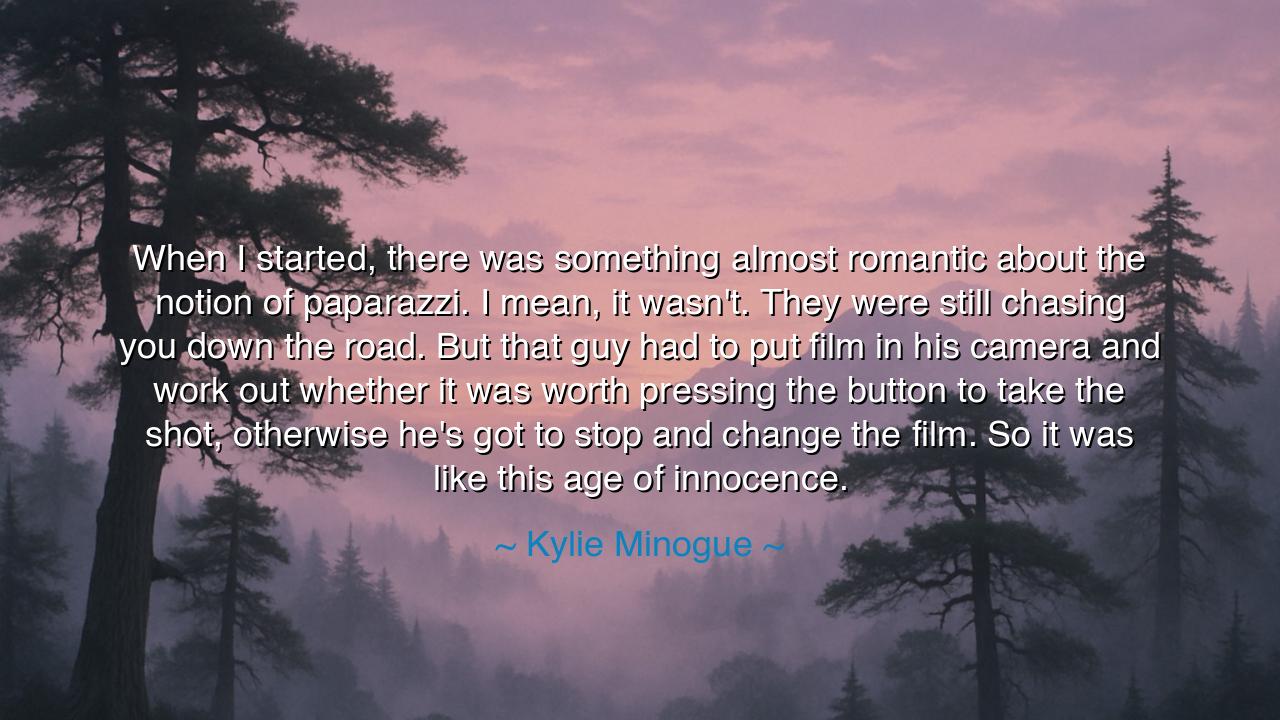
When I started, there was something almost romantic about the
When I started, there was something almost romantic about the notion of paparazzi. I mean, it wasn't. They were still chasing you down the road. But that guy had to put film in his camera and work out whether it was worth pressing the button to take the shot, otherwise he's got to stop and change the film. So it was like this age of innocence.






In the words of Kylie Minogue, a figure who has stood long in the glow of fame’s unrelenting light, there is a remembrance both wistful and profound: “When I started, there was something almost romantic about the notion of paparazzi. I mean, it wasn’t. They were still chasing you down the road. But that guy had to put film in his camera and work out whether it was worth pressing the button to take the shot, otherwise he’s got to stop and change the film. So it was like this age of innocence.” These words reveal the paradox of nostalgia: how even within hardship, we can later find a kind of tenderness when we compare it to the harsher realities of the present.
The ancients knew this well. They often looked back upon earlier ages as golden times, purer than their own. Hesiod, the Greek poet, wrote of the “Golden Age of Man,” when mortals lived in harmony with the gods before corruption seeped in. Minogue’s reflection carries this same yearning: she remembers an era when even the invasive glare of the paparazzi was tempered by limits—by the slowness of film, by the human choice of when to capture and when to wait. It was intrusive, yes, but it bore a trace of humanity, a romantic veil, compared to the relentless, instantaneous flood of today’s digital age.
For the paparazzi then had to labor. Each photograph required decision, skill, and sacrifice. Was the moment worthy of the shot? Could it capture something real? There was no endless clicking, no boundless memory card. In this, Minogue speaks of a kind of balance: even in their pursuit, there remained space for the artist behind the lens to hesitate, to measure, to choose. This hesitation gave the hunted—the celebrity—a brief margin of dignity. The chase was there, but it was bound by effort and limitation.
History, too, gives us parallels. In the days before the printing press, scribes labored over manuscripts, copying each page by hand. What was preserved was treasured, because it demanded time and toil. With the press came abundance, and with abundance came carelessness. Similarly, the shift from film to digital altered the weight of the image. What was once a singular, decisive moment became an endless barrage. Minogue, in recalling this earlier age, reminds us of the dignity that limitation gives—how scarcity lends value to even the most difficult experiences.
The deeper meaning of her words is this: that technology does not only change tools, it changes relationships—between people, between artist and subject, between memory and reality. The old age of innocence she describes was not innocent in truth, but it contained traces of restraint, traces of humanity’s slower rhythm. Now, in an era of instant capture and infinite reproduction, that restraint has vanished, leaving only unending pursuit. What was once “almost romantic” has become cold machinery, ceaseless and merciless.
The lesson is clear: in all things, be mindful of how progress shapes not only our capabilities but our souls. Ask yourself whether speed and abundance have enriched your life, or stripped it of depth. Honor limitations, for they give weight and meaning. Remember that every choice—whether to speak, to act, to capture a moment—gains dignity when it is deliberate.
Therefore, O listener, carry this wisdom: do not be seduced by the flood of immediacy. Slow down, as those with film cameras once slowed down. Choose your moments, measure their worth, and do not let your life become an endless blur of unexamined images. For even in the chase, even in hardship, there can be dignity, if we preserve the discipline to pause, to decide, and to honor what truly matters.






AAdministratorAdministrator
Welcome, honored guests. Please leave a comment, we will respond soon